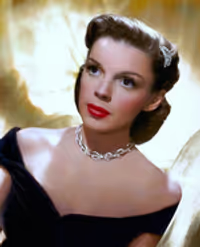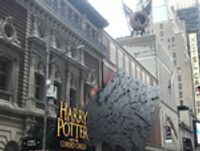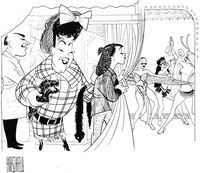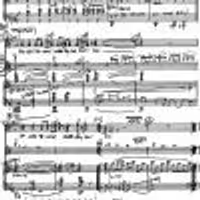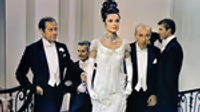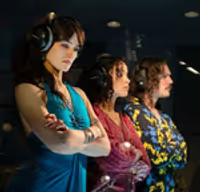MY FAIR LADY (2018) Previews
#175MY FAIR LADY (2018) Previews
Posted: 3/16/18 at 10:04am
It's so great to hear that Sher has taken a risk with re-staging the ending to this beloved musical, and get the first preview praises, in comparison to the disappointed reports of Jack O'Brian and his production of Carousel. Seriously, two musical revivals couldn't have been so bluntly different to each other that it's night and day.
At this point in the season, the Best Musical Revival Tony is undoubtedly between Once on this Island and My Fair Lady.
#176MY FAIR LADY (2018) Previews
Posted: 3/16/18 at 10:12am
If I may add to jaybee's description--she takes the hand that has caressed his cheek and touches her heart with it.
As jaybee says, it's all very uncharacteristic and dreamlike. And *wordless*--from a character who is defined entirely by her words.
#177MY FAIR LADY (2018) Previews
Posted: 3/16/18 at 10:14am
After Eight said: "What something "sounds like," and what something actually is are two entirely different matters. This production offers a case in point."
After Eight, I support you nearly all the time on here in your dissents because I believe everybody has the right to their own opinion—but this statement makes me wonder if you were even at the show last night.
#178MY FAIR LADY (2018) Previews
Posted: 3/16/18 at 10:18am
BWAY Baby2 said: "Just because someone pulls the plug on a relationship today- does not mean a reconciliation is not possible tomorrow- c'mon- how many times have we all been in relationships where the push and pull - and break ups- have been present- and yet the relationship still resumes- my self- my partner of 22 years and I broke up three times before we came back together for good. Eliza showing her independence a the end does not necessarily take away the ambiguity of resuming the relationship in the future- I see it April 1- will write about it after I see it."
There's a difference between breaking up due to circumstances and breaking up because the relationship is toxic. Personally the second deserves no second chance under any circumstances.
#179MY FAIR LADY (2018) Previews
Posted: 3/16/18 at 10:19am
Eliza does speak in the final scene. Ambrose said, softly, “I washed me hands and face before I came, I did.”
Henry also still asked her where his slippers were.
Even still, there was indeed a ghost-like quality, and Ambrose is bathed in a blue light as she exits up the aisle.
jaybee3907
Swing Joined: 7/7/14
#180MY FAIR LADY (2018) Previews
Posted: 3/16/18 at 10:26am
Ah, yes. She did say that. I forgot. And I definitely couldn't see her touch her heart from my point of view. I have bought a ticket in the Loge with a straight on view for my birthday in May and I can't wait to revisit. I wouldn't change sitting close, even if off center for anything. Higgins was turned towards me while listening to her recording. The look on his face was heartbreaking. For the first time, I really felt for him. That look is also what gives me the impression that it was his fantasy/imagination.
#181MY FAIR LADY (2018) Previews
Posted: 3/16/18 at 10:29amFor those who know, what’s the stage direction in the original libretto? Is the ending open-ended? Is Eliza supposed to get the slippers (unlike in the MFL film)?
After Eight
Broadway Legend Joined: 6/5/09
#182MY FAIR LADY (2018) Previews
Posted: 3/16/18 at 10:33am
"If it makes you feel better, one can still take this ending and imagine Eliza and Higgins continuing their Sam/Diane routine"
Thank you very much for your kind solicitude, but, sorry, it doesn't make me feel any better. And I don't have to "imagine" anything, because I saw. And what I saw I did not like.
The only consolation in these dismaying enterprises is that it makes you appreciate even more how lucky you were to have experienced the glory of an original production, that is if you were lucky enough to have experienced it. I was lucky enough. I appreciated my good fortune then and was infinitely grateful. That gratitude has only grown through the years. It grew a millionfold last evening.
And another point. You seem very pleased at the discussion this production has engendered. Personally, when I go to see a show, I don't give a hoot in hell if it provokes a discussion or not. I just want to see a production done RIGHT.
ScottyDoesn'tKnow2
Broadway Legend Joined: 1/22/14
#183MY FAIR LADY (2018) Previews
Posted: 3/16/18 at 10:37am
I'd argue that a production of MFL done right is supposed to generate these types of discussions. This is not a musical dealing with fluff or forgettable themes here. The themes and subthemes centering on class, gender, middle class morality, and social mobility are all present in MFL and quite explicitly.
h6p8gv
Featured Actor Joined: 7/31/03
#184MY FAIR LADY (2018) Previews
Posted: 3/16/18 at 11:10am
Can someone please post the understudy list
#185MY FAIR LADY (2018) Previews
Posted: 3/16/18 at 11:17am
I stand by my statement that I prefer art that values form over polemics, but I absolutely agree that a show like this is the ideal--ravishing on the surface while meaningfully engaged with real ideas.
Eliza's ultimate conflict is telegraphed from the moment she and Mrs. Pearce and Pickering ask Higgins what will become of her after the experiment. Higgins' intent is to demonstrate that improving Eliza's speech will elevate her class yet she will NOT be a member of the upper class. She will have no connections, no friends, no family and a woman alone in that society was nearly powerless--upper class even more than lower, as propriety prevents most of the (few) options which would provide any degree of autonomy.
The degree to which there is almost no satisfactory resolution to this question is, it seems to me, the same degree to which there is no completely satisfactory resolution to the show, and the resulting discussion is quite interesting. In my opinion.
#186MY FAIR LADY (2018) Previews
Posted: 3/16/18 at 11:20amI’m really starting to doubt After Eight sees any of these productions he loathes so much. Can’t offer specifics and only chimes in on things after a bunch of positive posts are made. We need to stop feeding the troll.
#187MY FAIR LADY (2018) Previews
Posted: 3/16/18 at 11:25am
Thank you all for the euphoric reviews! Just managed to somehow find a dead center front row loge seat for late May - woohoo!
(Also, what planet do we live on that $200/ticket is "non-premium pricing"? Oof.)
#188MY FAIR LADY (2018) Previews
Posted: 3/16/18 at 11:34am
kade.ivy said: "For those who know, what’s the stage direction in the original libretto? Is the ending open-ended? Is Eliza supposed to get the slippers (unlike in the MFL film)?"
Do you mean in Pygmalion? IIRC, there's no mention of slippers. He asks her to do some shopping for him, or something like that. (Another reason I like the Lerner ending. ![]() Number one, he ties it back to previous events, and number two, he's clearly not serious about her getting his slippers, while in Shaw he clearly is serious about her doing the shopping.)
Number one, he ties it back to previous events, and number two, he's clearly not serious about her getting his slippers, while in Shaw he clearly is serious about her doing the shopping.)
#189MY FAIR LADY (2018) Previews
Posted: 3/16/18 at 11:38am
Mildred Plotka said: "I’m really starting to doubt After Eight sees any of these productions he loathes so much. Can’t offer specifics and only chimes in on things after a bunch of positive posts are made. We need to stop feeding the troll."
In this case, he only chimed in to piss and moan about the ending... after other posters already commented on what the ending was. He's offered zero else about the production and, in fact, refuses to.
And do we really believe he saw the original production, which closed 56 years ago? I've got my doubts, for sure.
After Eight
Broadway Legend Joined: 6/5/09
#190MY FAIR LADY (2018) Previews
Posted: 3/16/18 at 11:42am
Mildred,
You disappoint me.
Why not try using a little common sense, for once?
If I truly wanted to lie about having seen a production I hadn't, it would have been the easiest thing in the world for me to make up an opinion of actor's performance, the set design, or anything else, just based on previous comments, or on nothing at all.
#191MY FAIR LADY (2018) Previews
Posted: 3/16/18 at 11:48amAnyone who says they don’t go to the theatre to engage socially or emotionally with the material is just silly. Especially when the work is as blatantly socio-political as this when. Shaw wrote plays to engage a collective social conscience, not unlike Brecht. My Fair Lady is a direct adaptation of Shaw’s work, albeit with a potentially more crowd-pleasing ending. What Sher has done (as he did with South Pacific and King and I) is blend the worlds of the source material and the actual musical to create an entirely fresh look at a musical we know so well as a country. It’s damn near perfection, in my opinion.
Ravenclaw
Leading Actor Joined: 9/16/17
#192MY FAIR LADY (2018) Previews
Posted: 3/16/18 at 11:53am
Ok, we might as well clarify some facts about the history of the ending.
The original Pygmalion ends with the confrontation in Mrs. Higgins's home, concluding with Eliza's exit. Henry says to himself "Marry Freddy?" and laughs as the curtain comes down. Original audiences were confused and disappointed as to why Eliza and Henry didn't end up marrying, so Shaw wrote a "sequel" (more a "where are they now" ) which explains that Eliza marries Freddy and eventually maintains a cordial, platonic friendship with Henry.
The ending in which Eliza returns to Higgins was written for the 1938 film of Pygmalion, due to pressure from the studio which Shaw firmly opposed. That ending can be seen here: https://www.youtube.com/watch?v=tmdPj_XbF30 (I should note that the film is in the public domain, so its appearance in its entirety on youtube is legal. Also, it's a great film with some great performances).
The musical's script follows that ending exactly, reading:
(ELIZA walks softly into the room and stands for a moment by the machine looking at HIGGINS)
HIGGINS' VOICE: It's almost irresistible. She's so deliciously low, so horribly dirty. (ELIZA turns off the machine)
ELIZA: (Gently) I washed my face and hands before I come, I did.
(HIGGINS straightens up. If he could but let himself, his face would radiate unmistakable relief and joy. If he could but let himself, he would run to her. Instead, he leans back with a contented sigh pushing his hat forward till it almost covers his face)
HIGGINS: (Softly) Eliza? Where the devil are my slippers?
(There are tears in Eliza's eyes. She understands. The curtain falls slowly)
Lerner also includes a note at the front of the script which reads: "For the published version of Pygmalion, Shaw wrote a preface and an epilogue which he called a sequel. I have omitted the preface because the information contained therein is less pertinent to My Fair Lady than it is to Pygmalion. I have omitted the sequel because in it Shaw explains how Eliza ends not with Higgins but with Freddy and--Shaw and Heaven forgive me!--I am not certain he is right."
Anyone who objects to this production's ending subverting the text has to somehow reconcile that feeling with the knowledge that Lerner (and Shaw's film studio and co-screenwriters) knowingly subverted the original text. That ending was originally written because the sensibility of the audience wanted to see that happen. It only makes sense to revert it to the original ending now that that's where the sensibility of the audience is.
ScottyDoesn'tKnow2
Broadway Legend Joined: 1/22/14
#193MY FAIR LADY (2018) Previews
Posted: 3/16/18 at 12:04pm
I love that film version. I skipped ahead to where Eliza tells Freddy "Walk? Not bloody likely, I'm going in a taxi." and I was taken aback at how much David Tree, who played Freddy, looks like Henry Hadden-Paton.
Updated On: 3/16/18 at 12:04 PM#194MY FAIR LADY (2018) Previews
Posted: 3/16/18 at 12:04pm
As far as I'm concerned, anyone who would deliberately pair Eliza with Freddie deserved to be subverted. ![]()
That's my opinion. I realize there are many opinions on the subject. That one is mine.
#195MY FAIR LADY (2018) Previews
Posted: 3/16/18 at 12:15pm
Thank you, Ravenclaw and MCfan2. For some reason, I thought she throws the slippers at him in MFL. I knew they didn’t end up together in Pygmalion.
The stage directions-Higgins speaking “softly” and Eliza “understand[ing]-seem intentionally ambiguous. Given that ambiguity and the piece’s history, I think this ending is perfectly reasonable and earned.
#196MY FAIR LADY (2018) Previews
Posted: 3/16/18 at 12:17pm
kade.ivy said: "Thank you, Ravenclaw and MCfan2. For some reason, I thought she throws the slippers at him in MFL. I knew they didn’t end up together in Pygmalion."
She does throw them -- after they come home from the ball and he's been hogging all the credit. Not at the end.
#197MY FAIR LADY (2018) Previews
Posted: 3/16/18 at 12:17pm
I don’t think this production’s ending implies anything about her future. My hope - given Sher’s direction and Ambrose’s performance - is that she became the strong, independent woman she longed to be with the help of Mrs. Higgins. Diana Rigg’s performance strongly implies she understands her son’s moral deficiencies and is utterly taken by Eliza’s charm.
amaklo
Stand-by Joined: 5/2/15
#198MY FAIR LADY (2018) Previews
Posted: 3/16/18 at 12:24pm
Thanks to all who are posting about the first preview. I'm seeing this next month, shortly after it opens, and I'll be curious to see if the ending stays as you all describe. I don't have a problem with changing it from the movie (which I didn't like), but if the audience is confused about whether it's really happening or Higgins is dreaming it sounds like it needs some work.
I'm rereading "Everything Was Possible", about the original production of Follies, and Hal Prince and Michael Bennett made changes all the way up to opening night, sometimes influenced by audience reactions or lack thereof. Yes, it was a long time ago, and I don't know if things are still done that way, but as I say, I'm very interested to find out!
#199MY FAIR LADY (2018) Previews
Posted: 3/16/18 at 12:27pm
MCfan2 said: "kade.ivy said: "Thank you, Ravenclaw and MCfan2. For some reason, I thought she throws the slippers at him in MFL. I knew they didn’t end up together in Pygmalion."
She does throw them -- after they come home from the ball and he's been hogging all the credit. Not at the end."
Ah-must be what I was thinking. Thanks!
Videos


